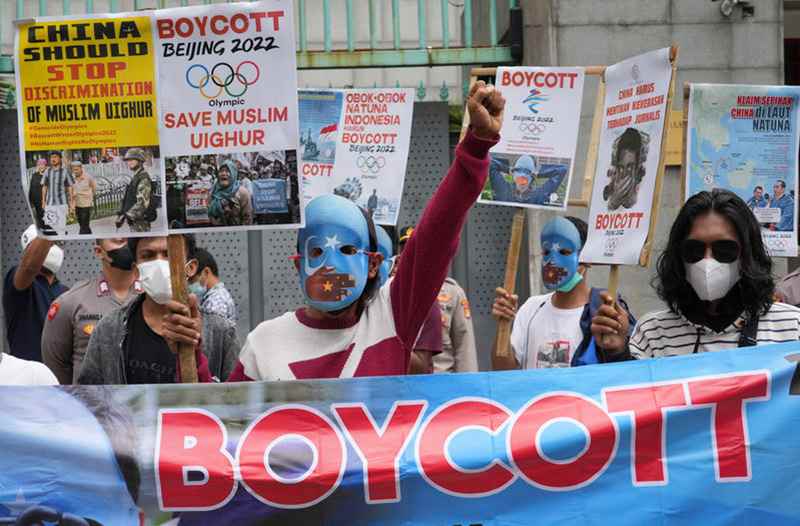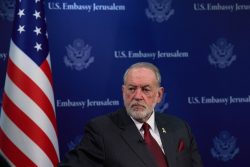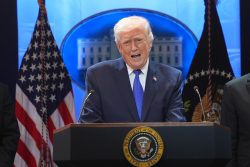
Student activists, some wearing masks with the colors of the pro-independence East Turkistan flag, shout slogans during a rally to protest the Beijing 2022 Winter Olympic Games, outside the Chinese Embassy in Jakarta, Indonesia on Jan. 14.
10:50 JST, January 26, 2022
When Beijing was awarded the 2008 Summer Olympics, the International Olympic Committee predicted the Games could improve human rights, and Chinese politicians hinted at the same.
Such talk is all but absent this time as the 2022 Beijing Winter Olympics open in just over a week.
The Games are a reminder of both China’s rise and its disregard for civil liberties, which has prompted a diplomatic boycott led by the U.S.
Rights groups have documented forced labor, mass detentions and torture, and the U.S. has called China’s internment of at least 1 million Uyghurs genocide. China has also come under criticism over the near-disappearance from public view of tennis star Peng Shuai after she accused a former senior member of the ruling Communist Party of sexually assaulting her.
But with more political, economic and military clout than it had 13 1/2 years ago, China appears to be worrying less about global scrutiny this time. And the COVID-19 pandemic has given it even more control over the Olympics, particularly with the isolation of visiting journalists, separated in a “bubble” from the Chinese population.
“There’s nothing to ‘prove’ at this point; 2008 was a ‘coming out’ party and all this one does is confirm what we’ve known for the last decade,” Amanda Shuman, a China researcher at the University of Freiburg, wrote in an email to The Associated Press.
“If anything, there’s a lot less pressure than 2008,” she said. “The Chinese government knows full well that its global economic upper hand allows it to do whatever it wishes.”
The IOC had few options when it awarded China the Games for the second time. Six possible European candidates, led by Norway and Sweden, bowed out for political or cost reasons. Voters in two other countries — Switzerland and Germany — voted no in referendums.
IOC members eventually picked Beijing — an authoritarian state that doesn’t need voter approval to proceed — over Almaty, Kazakhstan, in a close vote, 44-40.
The IOC has allowed China to avoid human rights oversight. Beginning with the 2024 Paris Olympics, host cities must adhere to the U.N. Guiding Principles on Business and Human Rights. But China was not subject to those rules when it was picked in 2015.
“When China hosts the Olympics again, it is no longer the China back in 2008,” dissident Chinese artist Ai Weiwei said in an email to The AP. Ai helped design the famous Bird’s Nest stadium that was used in the 2008 Games — hoping it would signify a new openness — and then regretted doing so, calling it and the Olympics China’s “fake smile.”
Ai was jailed in 2011 in China on unspecified charges and now lives in exile in Portugal. The Bird’s Nest will again host the opening ceremony on Feb. 4.
“China today has deviated further away from democracy, freedom of press and human rights, and the reality has become even harsher,” Ai added.
China’s tone has toughened since the last time it hosted the Games.
In 2008, Beijing put some curbs on broadcasting from Tiananmen Square but allowed it; agreed to “protest zones,” though they were never used, with access repeatedly denied; and dropped some reporting restrictions more than a year ahead of the Games. It also unblocked its censored internet for journalists.
In 2022, there is less accommodation. The pandemic will limit journalists to a tightly sealed “bubble,” though there will be internet access. Chinese organizers have warned foreign athletes that any statement that goes against Chinese law could be punished. And a smartphone app widely used by athletes and reporters has glaring security vulnerabilities, according to an internet watchdog.
Some national Olympic committees have advised teams and staff not to take personal phones or laptops to Beijing.
The IOC, which generates billions from sponsorships and broadcast rights, seldom pushes back in public against Chinese organizers who are, in reality, the Chinese government.
Some of the changes that affect 2022 began a month after the 2008 Olympics ended, when the global financial crisis hit. China fared better than most countries, which increased its confidence.
China has since seen the rise of Xi Jinping, who headed the 2008 Olympics and was named general secretary of the Communist Party in 2012.
“Although Xi was in charge of 2008 Olympic Games, the Winter Games is truly Xi’s Games,” said Xu Guoqi, who teaches history at the University of Hong Kong. He is the author of “Olympic Dreams: China and Sports, 1895-2008.”
Mary Gallagher, director of the Center for Chinese Studies at the University of Michigan, said the state of U.S. democracy and its “poor pandemic response” have further emboldened China.
“Right now the multiple U.S. failures create momentum for renewed nationalism and confidence in China,” Gallagher said by email. “This is made all the more effective by the Communist Party’s strict control over information, which can rain ‘positive energy’ down on what’s happening in China while only publicizing negative accounts of other countries, especially the U.S.”
China complained in 2008 that human rights protests around Tibet politicized the Olympics. The Olympic Torch Relay, taken on a world tour, faced violent protests in London and elsewhere. The IOC has not tried such a relay since.
China, which has called the allegations of human rights abuses the “lie of the century,” says mixing sports and politics goes against the Olympic Charter. IOC President Thomas Bach has likewise used that principle as a shield against critics.
But others see hypocrisy on China’s part.
“Sports and politics do mix,” Laura Luehrmann, a China specialist at Wright State University, said in an email. “Politics is about the distribution and use of limited resources — most notably power and decision-making, but also finances as well. Sports is all about power and money — even if framed as glorifying athletic achievement.”
Victor Cha, who served in the White House under President George W. Bush and is the author of “Beyond the Final Score — The Politics of Sport in Asia,” said China’s moaning about others politicizing sports is “the pot calling the kettle black.”
“There is no country that has ignored the Olympic Charter’s mandate to keep politics out of sports more than China,” Cha, who teaches at Georgetown University, wrote in an essay last week for the Center for Strategic & International Studies.
“Much as the world would like the Olympics to be devoid of politics, as George Orwell once wrote: ‘Sport is war minus the shooting.’”
Top Articles in News Services
-

Survey Shows False Election Info Perceived as True
-

Prudential Life Expected to Face Inspection over Fraud
-

Hong Kong Ex-Publisher Jimmy Lai’s Sentence Raises International Outcry as China Defends It
-

Japan’s Nikkei Stock Average Touches 58,000 as Yen, Jgbs Rally on Election Fallout (UPDATE 1)
-

Japan’s Nikkei Stock Average Falls as US-Iran Tensions Unsettle Investors (UPDATE 1)
JN ACCESS RANKING
-

Japan PM Takaichi’s Cabinet Resigns en Masse
-

Japan Institute to Use Domestic Commercial Optical Lattice Clock to Set Japan Standard Time
-

Israeli Ambassador to Japan Speaks about Japan’s Role in the Reconstruction of Gaza
-

Man Infected with Measles Reportedly Dined at Restaurant in Tokyo Station
-

Videos Plagiarized, Reposted with False Subtitles Claiming ‘Ryukyu Belongs to China’; Anti-China False Information Also Posted in Japan
























